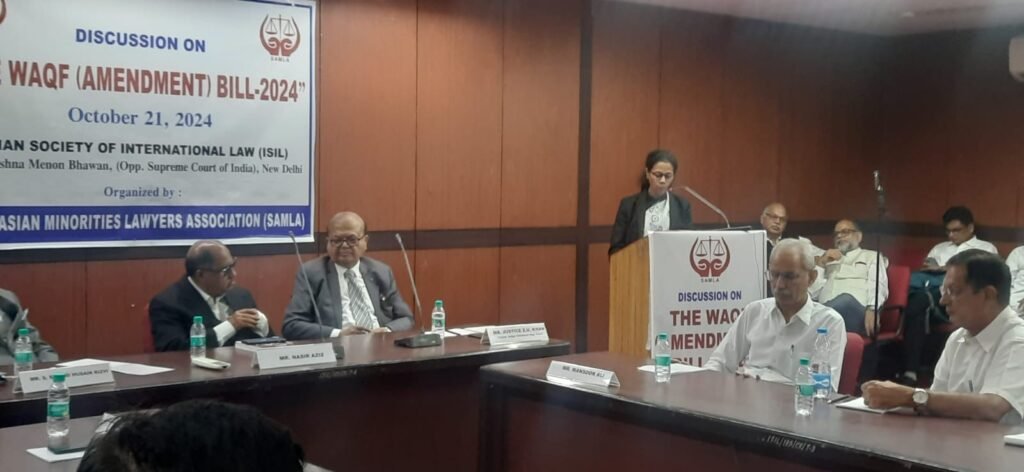Proposed changes dilute the deterrent effect and weaken the enforcement mechanisms intended to protect Waqf assets
Abdul Bari Masoud
NEW DELHI – The Joint Parliamentary Committee on Waqf (Amendment) Bill is an eyewash. It is not giving an audience to the genuine and legitimate stakeholders of the Waqf institutions, the South Asian Minorities Lawyers Association (SAMLA) has alleged.
At a roundtable conference on the proposed Waqf Bill at the Indian Society of International Law (ISIL) here on Monday, the participants unanimously declared that the Waqf (Amendment) Bill, 2024 is detrimental to the Waqf cause and a direct intrusion into one’s religious affairs. They also resolved to protect the Waqf cause with all available means under the law.
SAMLA is a pan-Indian organisation of practicing lawyers. It passed over half a dozen resolutions following extensive discussions on the contentious Waqf bill.
In his opening remarks, Adv. Nasir Aziz, President of SAMLA, stated that the organisation submitted a detailed memorandum to the JPC and all of its members regarding the contentious law, which included suggestions and concerns. “However, regrettably, we did not receive even an acknowledgment. We had a conversation with Ms. B. Joshi, the undersecretary, who said that it ought to be regarded as submitted and that she would fetch it,” Aziz added.

He also disclosed that they had repeatedly made a request to the JPC for an in-person hearing, but did not hear back from them yet.
“As a group of advocates, we have some legitimate legal concerns to bring before the JPC, but it isn’t responding to us,” he said.
In his keynote address, Supreme Court advocate Syed Shahid Rizvi outlined the harmful provisions of the proposed Waqf Bill. He stressed the legislative history of “Waqf” in India while tracing the theological roots of the term back to the Holy Quran and Sahih Hadeeths, drawing attention to the possible legal ramifications for Waqf institutions in the whole country. The three fundamental characteristics of Waqf — perpetuity, irrevocability, and inalienability — were emphasised by Rizvi, who also noted that these ideas are backed by a strong body of law and multiple rulings from the Supreme Court.
Among the main issues and concerns brought up by the participants during the roundtable discussion were the following:
(i) The Bill alters the fundamental essence and character of the Waqf. The proposal to amend the definition of Waqf would do away with “Waqf by user” (Section 3(r)), introduce inheritance laws (Section 3A(2)), ban non-Muslims from making donations to Waqf (Section 20), and limit the creation of Waqf for practicing Muslims for five years (Section 3(r)). These modifications have the potential to seriously damage the Waqf’s current structure, directly meddling in Muslims’ religious matters and possibly breaching Articles 14, 25, 26, and 30 of the Constitution.
They also emphasised how the Bill alters the character and makeup of different Waqf Boards. In contrast to established practices seen in other religious communities, such as Hindu temples, Sikh gurudwaras, Jain temples, and Buddhist monasteries, where legal affairs are managed exclusively by members of the respective faiths to maintain the integrity of the institutions, the proposed Bill introduces significant changes to the composition and management of the Central Waqf Council and Waqf Boards.
The lawyers also underlined that instead of safeguarding Waqf properties from encroachers and defaulters, the Bill shows leniency towards defaulters and encroachers and it further undermines the legal framework by reducing the severity of punishments. Specifically, the penalty for the alienation of Waqf property without sanction is lowered from rigorous imprisonment to simple imprisonment. Additionally, this offence is reclassified from cognisable and non-bailable, triable by a magistrate of the first class, to non-cognisable and bailable, triable by a magistrate. These changes dilute the deterrent effect and weaken the enforcement mechanisms intended to protect Waqf assets.
Furthermore, Section 3B of the Bill mandates that all registered Waqfs must file their details on the portal within six months, failing which they would forfeit their rights in a court of law, as stated in Section 36(10). These provisions, which effectively oust judicial review, are not only contrary to the rule of law but also significantly benefit encroachers and defaulters at the expense of Waqf institutions.
Presiding over the event, former judge of Allahabad High Court, Justice ZU Khan said it was a matter of concern that legitimate stakeholders like SAMLA were not invited by the JPC.
Referring to New Delhi’s Sunheri Masjid case, he said several unscrupulous elements in the community are causing immense damage to Waqf institutions. “If we want to safeguard Waqf properties we need to keep an eye on their activities, Justice Khan added.
Citing several allegations levelled at the JPC by member MPs, Supreme Court advocate ZK Faizan said the way the parliamentary committee has been functioning reinforces doubt about its integrity. He said the bill was brought with a political motive and needed to be dealt with at a political level.
The conference passed several resolutions forcefully demanding a personal hearing with the JPC.

